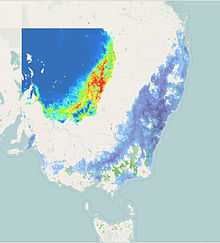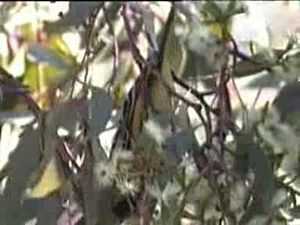Regent honeyeater
| Regent honeyeater | |
|---|---|
| | |
| Conservation status | |
| Scientific classification | |
| Kingdom: | Animalia |
| Phylum: | Chordata |
| Class: | Aves |
| Order: | Passeriformes |
| Family: | Meliphagidae |
| Genus: | Anthochaera |
| Species: | A. phrygia |
| Binomial name | |
| Anthochaera phrygia (Shaw, 1794) | |
 | |
| Distribution of the regent honeyeater, see file for more details. | |
| Synonyms | |
|
Xanthomyza phrygia | |
The regent honeyeater (Anthochaera phrygia) is a critically endangered bird endemic to South Eastern Australia. It is commonly considered a flagship species within its range, with the efforts going into its conservation having positive effects on many other species that share its habitat. Recent genetic research suggests it is closely related to the wattlebirds.
Taxonomy
First described by the naturalist George Shaw in 1794, the regent honeyeater was known as Xanthomyza phrygia for many years, the genus erected by William John Swainson in 1837. However, genetic analysis shows that its ancestry is in fact nested within the wattlebird genus Anthochaera, and hence it is correctly described as Anthochaera phrygia. However it has retained the name Xantomyza as a subgenus.
Distribution
The regent honeyeater was once common in wooded areas of eastern Australia, especially along the inland slopes of the Great Dividing Range. It once could be found as far west as Adelaide, but is now gone from South Australia and western Victoria. The population is now scattered, with the three main breeding areas being the Bundarra-Barraba area and Capertee Valley of New South Wales, and north-eastern Victoria.[2]
Important Bird Areas
BirdLife International has identified the following sites as being important for regent honeyeaters:[3]
- Queensland
- New South Wales
- Brisbane Water
- Bundarra-Barraba
- Capertee Valley
- Greater Blue Mountains
- Hastings-Macleay
- Hunter Valley
- Lake Macquarie
- Mudgee-Wollar
- Richmond Woodlands
- Tuggerah
- Victoria
- Warby-Chiltern Box-Ironbark Region
Behaviour

The regent honeyeater exhibits unusual behaviour, in that particularly during winter, isolated individuals of this species associate with and then often mimic the calls of wattlebirds and friarbirds. Although many birds display the behaviour of vocal mimicry, no other bird species is known to mimic close relatives in this way. See Veerman, P.A. 1992 & 1994 Australian Bird Watcher.
Conservation status
The regent honeyeater is listed as endangered on the IUCN Red List and under both Australia's Environment Protection and Biodiversity Conservation Act 1999 and Queensland's Nature Conservation Act 1992. The Action Plan for Australian Birds 2010, compiled by researchers from Charles Darwin University and published in October 2011 by the CSIRO, added the regent honeyeater to the "critically endangered" list, giving habitat loss as the major threat.[4]
References
- ↑ BirdLife International (2013). "Xanthomyza phrygia". IUCN Red List of Threatened Species. Version 2013.2. International Union for Conservation of Nature. Retrieved 26 November 2013.
- ↑ Menkhorst, Peter; Schedvin, Natasha; & Geering, David (1999-05-00). "Regent Honeyeater (Xanthomyza phrygia) Recovery Plan 1999-2003". Department of the Environment, Water, Heritage and the Arts, Australia. Retrieved 2011-06-08.
- ↑ BirdLife International. (2011). Important Bird Areas. Downloaded from http://www.birdlife.org on 2012-01-02.
- ↑ Garnett, Stephen; Szabo, Judit and Dutson, Guy (2011). The Action Plan for Australian Birds 2010. Collingwood, Vic: CSIRO. ISBN 978-0-643-10368-9.
External links
| Wikimedia Commons has media related to Anthochaera phrygia. |
| Wikispecies has information related to: Xanthomyza phrygia |
